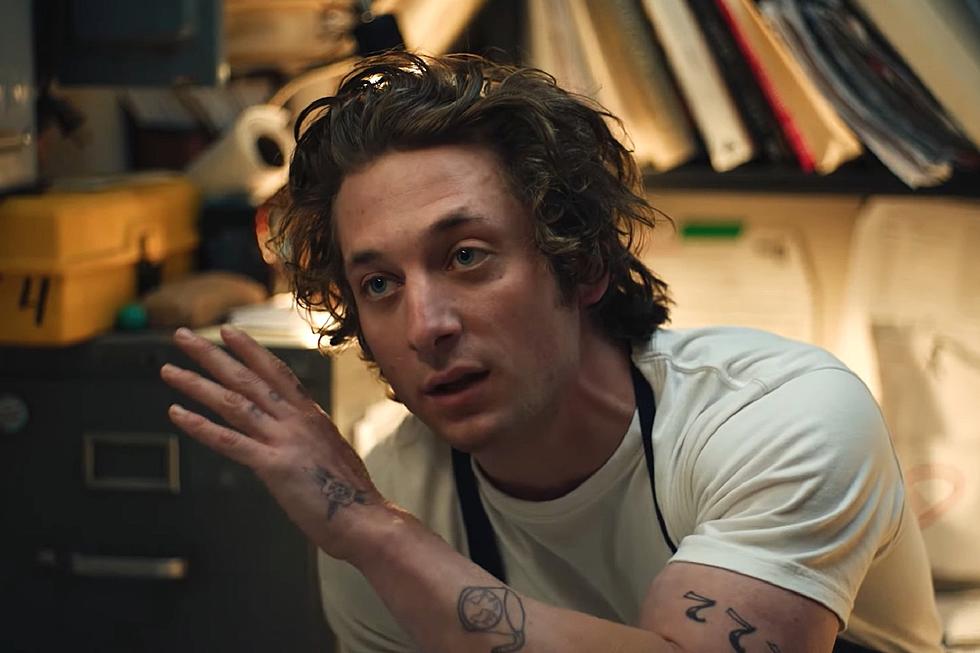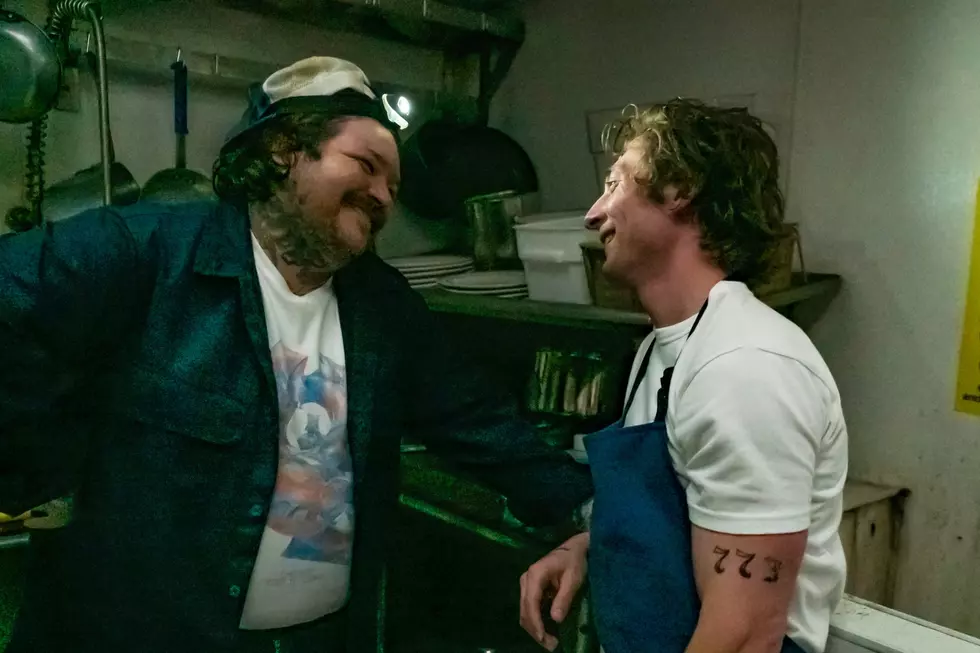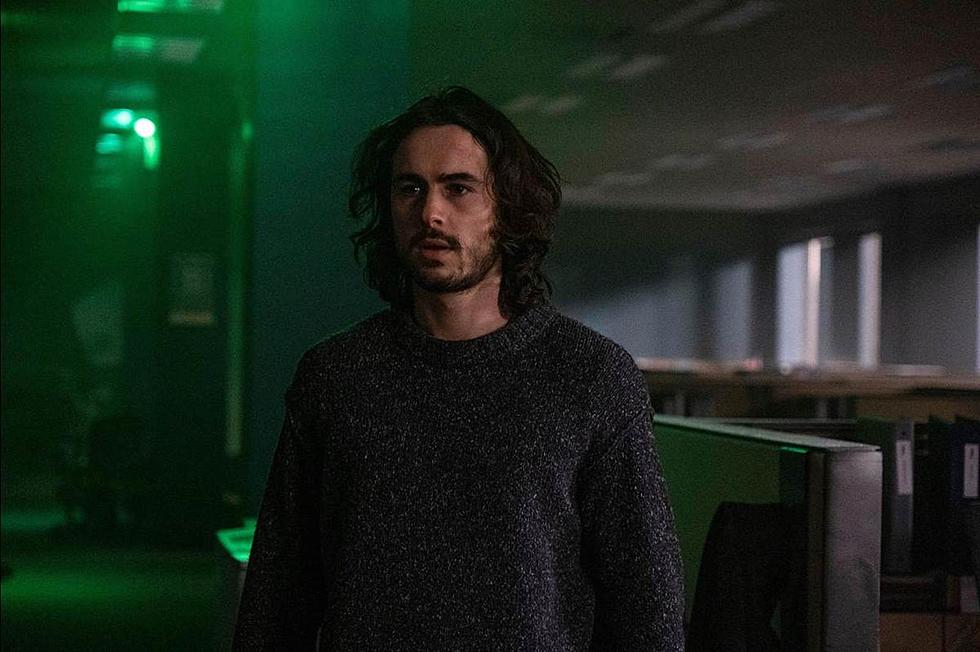
‘American Horror Story: Asylum’ Review: “Madness Ends”
It's the finale of 'American Horror Story: Asylum,' with less horror and way more melodrama. And if you thought you'd never see Adam Levine again, you were sadly mistaken.
Don't worry, we only have to deal with Adam Levine again long enough to revisit how he lost his arm to Bloody Face Jr. at Briarcliff. The opening sequence this week is more stylized than usual, playing out like a promo for the show rather than a legitimate scene, which is fine, but does little to advance the plot. We're treated to Bloody Face Jr.'s side of the Adam Levine story from earlier this season, but it's not like the show is giving us any new information. The biggest addition is an imagined interaction between father and son, giving us a chance to bid farewell to Dr. Thredson. I'm not sure what the show is trying to teach us here -- mommy issues beget mommy issues?
But this finale is really Lana Winters' swan song, or more accurately, her extended therapy session. Now a renowned television reporter who blew the lid off of Briarcliff, not out of a desire for justice, but out of greedy ambition, sits down for an interview and recalls how she returned to Briarcliff hoping to free Jude, only to find her gone. The retro-70s footage of Lana's exposé is impeccably done, making me wish we had an entire episode of Lana's Briarcliff exposé special. This leads Lana to Kit, of course, who is now raising his two kids on his own with the soon-to-be new Mrs. Walker, and who tells her, privately, the story of how he freed Jude himself because he needed to forgive her so he could move on for his kids. Most of these sequences are overly-wrought with melodrama and are soapy in nature, but the one shining moment occurs when Jude, still confused and reeling from her time locked away, is led by the children to the woods -- when she returns, she's healed, presumably due to alien healing, and lives her life peacefully for a few months before she dies.
Jude's death scene is beautiful, almost like an apology from Ryan Murphy for all the pain and suffering Jude endured this season. Her bed moves closer into focus as the angel of death greets her for a goodnight kiss, the room fades to darkness, and the camera gives way to a soft, heavenly glow. For all the trashy sensibilities throughout both seasons, Murphy and Co. can really allow for some lovely, genuine moments amid the noisy plotting. It's hard to believe we could get such soft scenes from the same show that's given us chronically masturbating mental patients and vaginal euphemisms like "mossy bank."
I'd even say that the final confrontation between Lana and Bloody Face Jr. (who we now know enjoys eclairs in addition to meth) is well-played, though a bit far-reaching. Lana hires a private investigator to find her son, and knows he'll be there for her TV interview. When everyone has left, she allows him to confront her, then convinces him to lay down his gun and accept the mother's love he never had. Of course it's only fleeting and the scene ends with Lana shooting him before we go back in time to 1964, when Jude warned Lana about ambition being her eventual ruin, and how it would bring her nothing but pain and suffering. Jude's words were prophetic, but I wonder what this season is trying to say as a whole.
We've seen how evil begets evil, how institutionalization in a broken-down system can break people rather than save them, how power is intoxicating, how men play God, and the results of systematic repression -- I'd expect nothing less from a horror series that takes place in an asylum. But the message Murphy seems to be delivering by going full circle, back to Lana and Jude's first encounter, is that for a woman to be ambitious in the 60s was wrong. Lana's ambition destroyed people around her, from her loved ones to those who were evil. And if we look at the way women have been portrayed this season, they've all been insane, homicidal, and power-hungry, but above all, they were to blame for Thredson's insanity and the insanity of his son. It's almost like an analogy on a standardized test -- all killers have mommy issues but not all killers have mommies. I'm not saying Murphy has a problem with women, and clearly both sexes were portrayed as equally flawed on the series, but the final scene, which seems to serve as some sort of thesis statement, indicates that Lana's ambition was the real killer, and it detracts from so much of what this show has had to say. And every statement this show has made has been delivered with the same blunt force as this scene. Are we to understand that Lana's ambition was only wrong in the context of the time, or that her ambition would have been wrong no matter the era? Maybe I'm reading too much into this. Maybe the cannibal mutants should have given me a clue.
While this season has, at times, been almost painfully sloppy, Ryan Murphy and Co. seem to understand how to do one thing consistently well: the aliens are never once shown in full-view, allowing a sort of eerie mystery to persist. I personally take issue when most series or movies fully expose aliens -- the aliens are rarely creative in design, and seeing so much of them often diminishes their power, but here we're only treated to limbs and their image in reflection as they come to take Kit away from his painful life on Earth, slowly dying from pancreatic cancer. It's never as unnerving as it could be (because they're aliens on a show about a wackadoo asylum), but it shows restraint.
Which brings me to the biggest compliment I can give Ryan Murphy and the 'AHS' team for season two -- they seem to have learned a little restraint. It's not a whole lot, and there's still so much of this show that could use a little subtlety and less on-the-nose social preaching, but it's enough to subdue the show, which at times feels like a mash-up of pop culture, and other times reads like Ryan Murphy's overworked vision board. But regardless of how messy and convoluted the show can be, it's never boring. 'AHS' is always interesting, even -- and especially -- when it's overstuffed.
More From ScreenCrush









